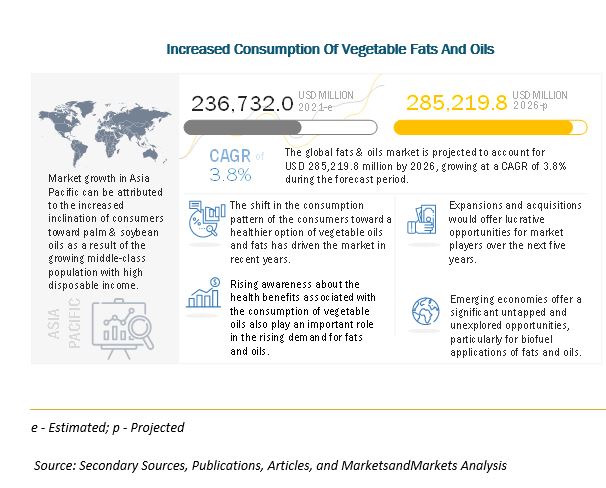The global fats and oils market size is projected to reach USD 285.22 billion by 2026, recording a CAGR of 3.8% during the forecast period. The global market was estimated to be valued at USD 236.7 billion in 2021. It Fats and oils are simple or mixed glyceryl esters of various organic acids, which belong to the fatty acid series; they are derived from plant or animal sources. Primary sources of fats and oils include plant sources, such as soybean, palm, rapeseed, olive oil, and sunflower oil; animal sources include butter & margarine, tallow, and lard. Apart from food uses, vegetable fats and oils are also increasingly used for industrial applications, such as soaps, detergents, paints, oleochemicals, the major one of them being biodiesel.

Here are some trends shaping the fats and oils market:
- Health Consciousness: Consumers are increasingly opting for healthier fats and oils options, such as olive oil, avocado oil, and coconut oil, due to their perceived health benefits. There's a growing demand for oils high in unsaturated fats and omega-3 fatty acids, driven by trends towards healthier eating habits.
- Plant-Based Alternatives: The rise of veganism and plant-based diets has led to a surge in demand for plant-based fats and oils. This includes oils derived from sources like soybeans, sunflowers, and canola. Additionally, alternative sources such as algae oil are gaining traction.
- Sustainable Sourcing: Environmental and ethical concerns are influencing consumer choices, prompting a shift towards sustainably sourced fats and oils. Palm oil, in particular, has faced scrutiny due to deforestation and habitat destruction. As a result, there's a growing demand for sustainably produced palm oil and alternatives.
- Clean Label and Transparency: Consumers are becoming more discerning about the ingredients in their food products. There's a rising preference for fats and oils with clean labels, free from additives, preservatives, and genetically modified organisms (GMOs). Brands that prioritize transparency in their sourcing and production processes are gaining favor.
- Functional Oils: There's increasing interest in oils that offer additional health benefits beyond basic nutrition. Functional oils enriched with vitamins, antioxidants, and other bioactive compounds are gaining popularity. For example, omega-3 fortified oils are marketed for heart health, while vitamin E-enriched oils are promoted for their skin benefits.
- Convenience and Innovation: Busy lifestyles are driving demand for convenient cooking solutions. This has led to innovations such as spray oils, pre-measured portion packs, and ready-to-use cooking oils. Brands are also experimenting with new flavor profiles and formulations to cater to evolving consumer preferences.
- Globalization and International Trade: The fats and oils market is highly globalized, with significant trade flows between regions. Changes in trade policies, geopolitical factors, and currency fluctuations can impact market dynamics and supply chains. Emerging economies, particularly in Asia-Pacific, are driving growth in consumption and production.
Fats and Oils Market Drivers: Increasing demand for food boosting global consumption of vegetable oils
Edible oil products such as palm oil, sunflower oil, soybean oil, canola oil, among others, generally undergo purification through various methods, such as degumming, neutralizing, bleaching, and deodorizing, to produce uniformity in high-quality oil. In the purification process, minor components are either physically or chemically separated as they are considered impurities. The high-quality edible oils are mostly referred to as refined oils. Refined oils are high in monounsaturated fats.
High-quality oils are made using advanced technologies and are considered a rich source of nutrition. Hence, their consumption is increasing every year due to its increasing application and the growing population. However, the demand for high-quality oils is growing as consumers are opting for healthier alternatives to maintain the taste while enhancing the nutritional value. To meet this demand, manufacturers are improvising on processing technologies and also enhancing their product portfolios. ADM (U.S.), along with Novozymes (Denmark), developed a technology that revolutionized the fats & oils industry. This technology helped the company in manufacturing high-quality edible oils by utilizing enzymes in the developing process.
Download PDF Brochure: https://www.marketsandmarkets.com/pdfdownloadNew.asp?id=6198812
On the basis of source, vegetable segment is expected to retain its dominance in the foreseeable period
Vegetable oils from sunflower, rapeseed, soybean, palm, cottonseed, and coconut are highly used in food applications which has driven the market for vegetable-sourced oils. The qualities associated with vegetable oils such as low-fat, low-cholesterol, and low-calories content are registering growth in the segment. Also, the variety of use of vegetable oils in food as well as other industries such as pleo-chemical industries, animal feed, and energy & biomass industry has also driven the market for vegetable oils.
Asia Pacific is projected to be the fastest-growing region in the fats and oils market.
The Asia Pacific region is projected to be the fastest-growing market for fats & oils. The region is home to two important palm and palm kernel oil-producing countries namely Malaysia, and Indonesia: and two major fats & oils consuming countries namely China, and India. This is one of the significant factor which ensures that Asia pacific region is the largest as well as the fastest-growing market in fats & oils.
The Key players in this market include Associated British Foods PLC (UK), Archer Daniels Midland Company (US), Bunge Limited (US), Wilmar International Limited (Singapore), United Plantations Berhad (Malaysia), Unilever PLC (UK), Ajinomoto Co., Inc. (Japan), Mewah International Inc. (Singapore), Cargill, Incorporated (US), Richardson International Limited (Canada), International Foodstuff Company (UAE), Goodhope Asia Holdings Ltd. (Singapore), Vega Foods (Singapore), Welch, Holme & Clark Co., Inc. (US), Oleo Fats (Philippines), CSM Ingredients (US), AAK International (UK), Fuji Oil Co., Ltd. (Japan), Gemini Edible & Fats India Pvt Ltd. (India), and K S Oils (Singapore).
























